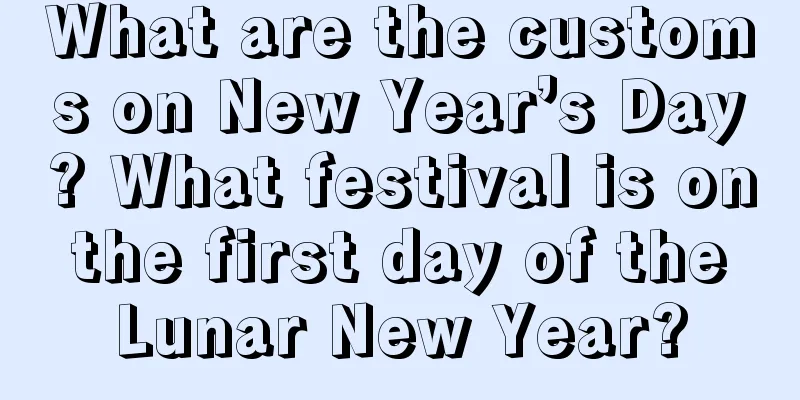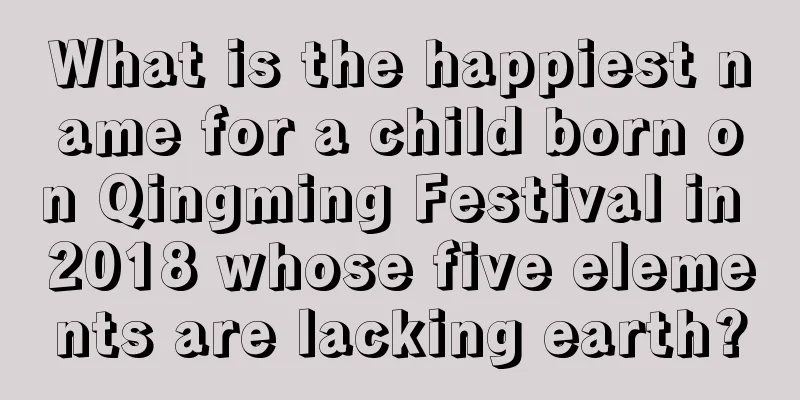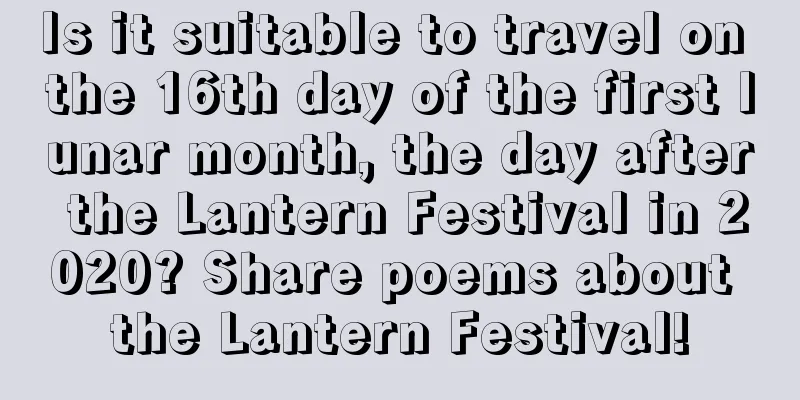What are the customs on New Year’s Day? What festival is on the first day of the Lunar New Year?

Introduction: China has been a traditional country since ancient times, so many traditional festivals came into being. The first day of the Lunar New Year is an important festival with many customs. So what are the customs on New Year’s Day? What festival is on the first day of the Lunar New Year? For more details about the 2018 Spring Festival, please visit Fortune Teller.com for consultation.What are the customs on New Year’s Day?New Year's greetings <br /> In ancient times, the original meaning of the word "New Year's greetings" was to wish the elders a happy new year. New Year greetings usually start at home. On the morning of the first day of the New Year, after getting up, the younger generation should first greet the elders and wish them good health, longevity and all the best. After receiving the greetings, the elders will distribute the "lucky money" prepared in advance to the younger generations. After paying New Year's greetings to the elders at home, people will also congratulate each other with a smile when they meet outside, and say auspicious words such as "Congratulations on making a fortune", "Good luck in all seasons", and "Happy New Year". Neighbors or relatives and friends will also visit each other to pay New Year's greetings or invite each other for drinks and entertainment.Opening Firecrackers <br /> On the morning of the Spring Festival, opening firecrackers are set off first to bring good luck. This is called "opening firecrackers". After the sound of firecrackers, the ground is covered with red fragments, as bright as brocade, which is called "Mantanghong". At this time, the streets were full of auspiciousness and joy. Divination of fortune <br /> In the old days, the Han people used the weather in the first few days of the new year to predict the harvest of the year. The theory originated from Dongfang Shuo's "Sui Zhan" in the Han Dynasty, which said that eight days after the year, the first day is the chicken day, the second day is the dog day, the third day is the pig day, the fourth day is the sheep day, the fifth day is the cow day, the sixth day is the horse day, the seventh day is the human day, and the eighth day is the grain day. If the day is sunny, the things it governs will flourish; if the day is cloudy, the things it governs will not prosper. Later generations followed this custom and believed that it was auspicious if the weather was clear, windless and snowless from the first to the tenth day of the lunar month. Later generations developed the fortune-telling into a series of sacrificial and celebratory activities. There is a custom of not killing chickens on the first day of the lunar month, not killing dogs on the second day, not killing pigs on the third day... and not executing people on the seventh day. Sticking pictures of chickens <br /> In ancient times, people would paint chickens on doors and windows during the Spring Festival to drive away evil spirits. The "Xuan Zhong Ji" written by a person from the Jin Dynasty talked about the celestial rooster on the Dushuo Mountain mentioned above. It said that when the sun just rose and the first ray of sunlight shone on the big tree, the celestial rooster crowed. As soon as it crows, all the chickens in the world start to crow. Therefore, the chicken cut during the Spring Festival actually symbolizes the celestial chicken. However, there is also a saying in ancient mythology that the chicken is a transformed version of the Chongming bird. It is said that during the reign of Emperor Yao, friendly nations offered tribute of a kind called the Chongming bird, which could ward off evil spirits. Everyone welcomed the arrival of the Chongming bird, but the tribute envoys did not come every year. So people carved a wooden Chongming bird, or cast a bronze Chongming bird and placed it at the door, or painted a Chongming bird on doors and windows to scare away evil spirits and ghosts so that they would not dare to come again. Staying up all night on New Year's Eve <br /> Stay up all night on New Year's Eve is one of the most important annual customs, and the custom has a long history. The earliest record can be found in "Fengtuzhi" by Zhou Chu of the Western Jin Dynasty: On New Year's Eve, people give gifts to each other, which is called "gifting the year"; they invite each other to drink and eat, which is called "saying goodbye to the year"; the young and the old drink together and give good wishes, which is called "dividing the year"; everyone stays up all night waiting for dawn, which is called "keeping the year". "One night connects two years, and the fifth watch divides two days." On New Year's Eve, the whole family gets together, eats the New Year's Eve dinner, lights candles or oil lamps, sits around the stove and chats, waiting for the moment to bid farewell to the old and usher in the new, and stays up all night, symbolizing the driving away of all evil plagues and diseases, and looking forward to a prosperous new year. This custom gradually became popular. In the early Tang Dynasty, Emperor Taizong of Tang, Li Shimin, wrote a poem called "Shousui": "The cold winter snow is gone, and the warmth comes in the spring breeze." To this day, people still have the habit of staying up on New Year's Eve to welcome the new year. What festival is on the first day of the Lunar New Year?The first day of the first lunar month was called the Spring Festival Yuanri, Yuanchen, Yuanzheng, Yuanshuo, Yuandan, Suidan, Suishou, Suizhao, Xinzheng, Shouzuo, Sanyuan or Nian, since the first year of Emperor Wu of the Han Dynasty, the first day of the first lunar month of the summer year (lunar calendar) is regarded as the "Suishou" (i.e. "year"), and the date of the New Year's Festival has been fixed and continues to this day. The New Year’s Day was called “New Year’s Day” in ancient times. After the Revolution of 1911, the Gregorian calendar (solar calendar) was adopted to count years, and January 1 of the Gregorian calendar was called "New Year's Day", and the first day of the first lunar month was called "Spring Festival".Summary: The above content is about [What are the customs on the first day of the Lunar New Year? What festival is on the first day of the Lunar New Year? 】Problem analysis, hope it can help everyone! |
Recommend
Is July 1, 2019 a good date for the Party's Founding Day? Check the auspicious and inauspicious time for the Party's Founding Day!
Introduction: In the traditional culture of our co...
The fate and fortune of people born in Bailu in 2020. Is Bailu a good day in 2020?
Introduction: People born in different solar terms...
What is the zodiac sign of people born in June of the lunar calendar in 2019 and how is their fortune?
The season of the sixth lunar month is beautiful. ...
What is the personality of people born on May 1st? How’s your life?
Introduction: As we all know, May 1st, which is Ma...
Is it a good time to move on the 12th day of the third lunar month in 2019? Can I move into a new home?
According to the Chinese lunar calendar, March is...
Is it auspicious to open a business on Chinese Valentine’s Day (8.4) in 2022? Where is the auspicious direction?
When opening a business, an auspicious day will be...
Is the sixth day of the seventh lunar month in 2018 an auspicious day? What does the hexagram show on this day?
Since ancient times, various schools of thought, s...
Why do we eat water chestnuts during the White Dew solar term? Are there any benefits of eating wild rice stem during Bailu?
Introduction: The solar terms are one of the tradi...
What zodiac sign is in May of 2019? How many days are there in the fifth lunar month?
The lunar calendar days change every year. What zo...
What time is Jingzhe on March 5, 2020, and what is the hexagram?
The Jingzhe solar term falls on March 5 or March 6...
Will there be thunder on the beginning of summer? What are the characteristics of the Beginning of Summer?
Lixia is the first solar term in summer. Do you wa...
Is March 18th of the lunar calendar 2021 a good day? Can I have a haircut?
Different days have different qualities. Some days...
What day is May 18th in the lunar calendar 2017? What month and date is it?
There is an important festival in the fifth month...
Is it auspicious to get engaged the day before New Year’s Day in 2020? Is New Year’s Day a traditional Chinese festival?
Introduction: You also need to choose an auspiciou...
Is it appropriate to get engaged on National Day in 2019? Can I register on National Day?
When National Day comes, many people will take adv...









